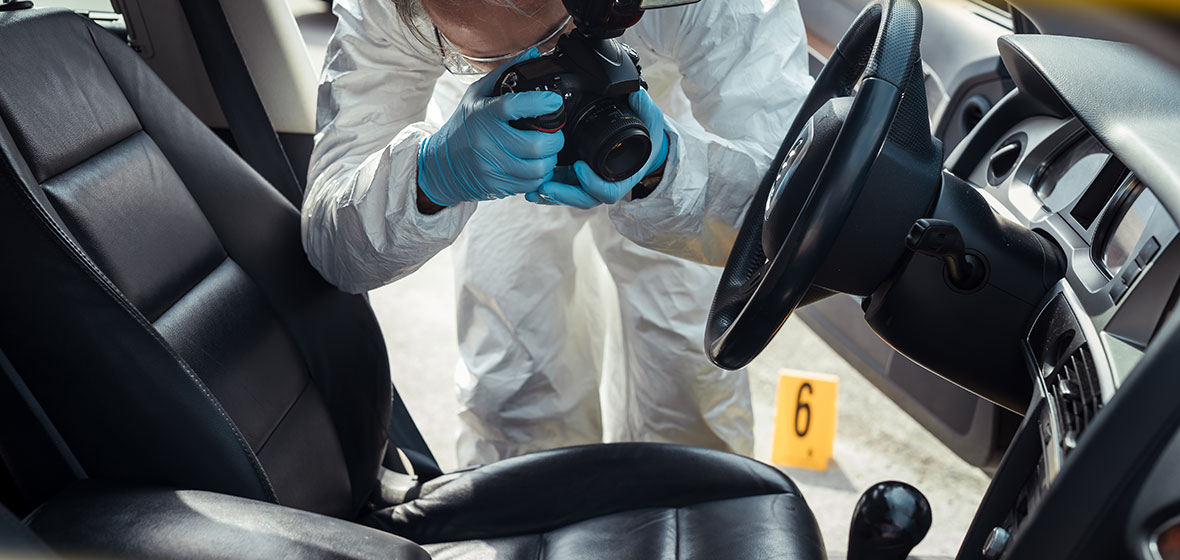Snapshot
- Historically, it has appeared that appeals from forensic procedure orders made by Magistrates lay only to the Supreme Court.
- In Lewis v Sergeant Riley [2017] NSWCA 272, the District Court was found to have jurisdiction to hear a forensic procedure appeal from an order made against a person by a Magistrate in the Local Court.
- With this decision, access to justice has been improved for people facing court-ordered forensic procedures.
Modern forensic techniques are important investigative tools for the criminal justice system. Forensic evidence can exonerate innocent people and lead to conviction of the guilty. Forensic procedures conferred by the Crimes (Forensic Procedures) Act 2000 (‘CFPA’) allow police to interfere with people’s rights by using coercion to investigate a crime. These ‘new and unprecedented powers’ (see Orban v Bayliss [2004] NSWSC 428 at [30]) and prosecutorial tools sit in tension with such fundamental individual rights as the right to privacy, bodily integrity, freedom from battery, freedom from self-incrimination and excessive interference from the State.
It is uncontroversial that the State can impose upon fundamental rights, but only with clear words (see Coco v The Queen (1994) 179 CLR 427 at 473) and the CFPA creates clear limits on the exercise of the powers it grants. Key circumstances require the order of a Magistrate and those orders are in turn amenable to appeal and review in the Supreme Court of NSW (see CFPA s 115A; Kerr v Commissioner of Police [2001] NSWSC 637).
To the authors’ knowledge, since the introduction of the CFPA, forensic procedure orders made in the Local Court have only been taken to the Supreme Court for appeal or review.
Lewis v Sergeant Riley – background
The case of Lewis v Sergeant Riley [2017] NSWCA 272 (‘Lewis’) arose following orders made by the Local Court for DNA ‘back capture’. Lewis and a related applicant by the name of Clark, were found to be ‘untested former offenders’ under Part 7A of the CFPA (CFPA s 75A) and the Magistrate was satisfied that a forensic procedure order for the taking of DNA was justified in all the circumstances (CFPA s 75L). Lewis and Clark sought to appeal on the merits to the District Court, rather than attempt an expensive, complicated and limited appeal to the Supreme Court, either on a question of law (or otherwise with leave) (Crimes (Appeal and Review) Act 2001 ss 52, 53 (‘CARA’)), or for judicial review (Supreme Court Act 1970 s 69).
The basis for the asserted District Court appeal was that forensic procedure applications are ‘application proceedings in the Local Court of NSW’ (Local Court Act 2007 s 44 (‘LCA’)). Lewis and Clark argued that an appeal provision in s 70(1)(b) LCA applied to forensic procedures.
The District Court found that it did not have jurisdiction to hear an appeal from a forensic procedure order pursuant to s 70(1)(b) because s 115A CFPA extinguished any other appeal right.
The applicants sought to review the District Court’s denial of jurisdiction in the Court of Appeal.
Section 70(1) LCA states:
‘Appeals
(1) In relation to any order arising from an application notice:
- an application for annulment may be made in accordance with Part 2 of the Crimes (Appeal and Review) Act 2001, and
- an appeal to the District Court may be made in accordance with Part 3 of the Crimes (Appeal and Review) Act 2001, and
- an appeal to the Supreme Court may be made in accordance with Part 5 of the Crimes (Appeal and Review) Act 2001,
in the same way as such an application or appeal may be made in relation to a conviction arising from a court attendance notice dealt with under Part 2 of Chapter 4 of the Criminal Procedure Act 1986.’
Section 115A(1)-(2) CFPA states:
‘115A Appeals from forensic procedure orders made by Magistrate
(1) An appeal against an order made by a Magistrate under this Act authorising the carrying out of a forensic procedure on a person may be made to the Supreme Court under Part 5 of the Crimes (Appeal and Review) Act 2001 as if the order were a sentence arising from a court attendance notice dealt with under Part 2 of Chapter 4 of the Criminal Procedure Act 1986.
(2) An appeal against a Magistrate’s refusal to make an order under this Act authorising the carrying out of a forensic procedure on a person may be made to the Supreme Court under Part 5 of the Crimes (Appeal and Review) Act 2001 as if the refusal were an order dismissing a matter under Part 2 of Chapter 4 of the Criminal Procedure Act 1986.’
The applicants argued that section 70(1) LCA creates three parallel review mechanisms:
- an application for annulment for orders made in the absence of the person
(s 70(1)(a)); - a District Court appeal by way of rehearing (s 70(1)(b)); and
- a Supreme Court appeal on a question of law (or otherwise with leave) (s 70(1)(c)).
The applicants argued that the right of appeal to the District Court under s 70(1)(b) LCA operates in parallel with other appeal rights and is not extinguished by the right of appeal to the Supreme Court under s 115A CFPA.
Court of Appeal decision
The Court of Appeal found that section 70(1)(b) LCA provided a statutory appeal to the District Court (per Basten JA, White JA and Fagan J each in separate judgments). The Court of
Appeal accepted that s 70(1) LCA creates parallel appeal rights to both the District and Supreme Courts.
Parallel appeals similar to this have existed in criminal law in NSW since 1902 (see Basten JA in Lewis at [17]). In the absence of clear words excluding a District Court appeal, s 70(1)(b)
applies to forensic procedure orders made against persons by the Local Court.
What is this ‘new’ appeal? Where to from here?
This District Court appeal is markedly more accessible than appeals to the Supreme Court. District Court appeals are a simpler and more efficient form of oversight. The discovery of this appeal brings the world of forensic procedures in line with the regular bipartite appeal structure from criminal and application proceedings in the Local Court of NSW.
The appeal route will be particularly significant for suspects who are children, or adult suspects considered incapable of understanding the general nature and effect of a forensic procedure or of considering consent to forensic procedures.
The District Court appeal is markedly more accessible than appeals to the Supreme Court. District Court appeals are a simpler and more efficient form of oversight. The discovery of this appeal brings the world of forensic procedures in line with the regular bipartite appeal structure from criminal and application proceedings in the Local Court of NSW.
In relation to such persons, the CFPA limits the availability of forensic procedure orders to court-ordered procedures which are thereby subject to the scrutiny of higher courts on appeal.
This newly discovered appeal is treated as a conviction appeal under CARA (ss 18, 20). It is an appeal from an application proceeding, which can be broadly classed as a civil proceeding (see L v Lyons (2002) 56 NSWLR 600 per Sully J see [21]-[28]; TS v Constable Courtney James [2014] NSWSC 984 per Adamson J at [21]; cf LCA Pt 3 Civil Jurisdiction). The Evidence Act 1995 applies (TS v James at [19]-[20]) and evidence should be provided to meet the elements of the test for the making of the order (see Simpson J in Orban v Bayliss [2004] NSWSC 428 at [45], [51]).
On appeal, the decision is a rehearing on the evidence below with a leave limitation on fresh evidence and with consideration of any credibility findings of the Court below (CARA
s 19; Charara v The Queen (2006) 164 A Crim R 39 at [13], [24]). Error may or may not be strictly required. This is a major debate ongoing in the higher courts, see particularly AG v Director of Public Prosecutions (NSW) [2015] NSWCA 218.
Whilst it may appear to be a departure from orthodoxy (the CFPA has been operational for 17 years), this ‘new’ appeal has been a missing link in the criminal justice system. The Law Society proposed such an appeal in submissions to the NSW Law Reform Commission (‘LRC’) during its reference on Criminal Appeals (New South Wales Law Reform Commission Criminal Appeals Report 140 (2014)).
The LRC recommended that forensic procedure orders be subject to the same avenues of appeal as conviction (recommendation 7.12). A District Court appeal should lie, and the Court of Appeal’s declaration confirms that it does.
This newly discovered appeal is a highly practical and sensible check in a finely balanced system – a system which grants police the power to substantially impose upon people’s individual liberties. This appeal levels the playing field and puts forensic procedure orders on the same footing as other criminal and
applications proceedings. Lewis represents a significant expansion of access to justice for the people of New South Wales.
* The ALS represented Lewis and Clark; Felicity Graham was co-counsel in the Court of Appeal proceedings.



 Felicity Graham is a barrister at Sir Owen Dixon Chambers. Jeremy Styles is Criminal Practice Principal Solicitor at the Aboriginal Legal Service and a member of the Law Society’s Criminal Law Committee.
Felicity Graham is a barrister at Sir Owen Dixon Chambers. Jeremy Styles is Criminal Practice Principal Solicitor at the Aboriginal Legal Service and a member of the Law Society’s Criminal Law Committee.

